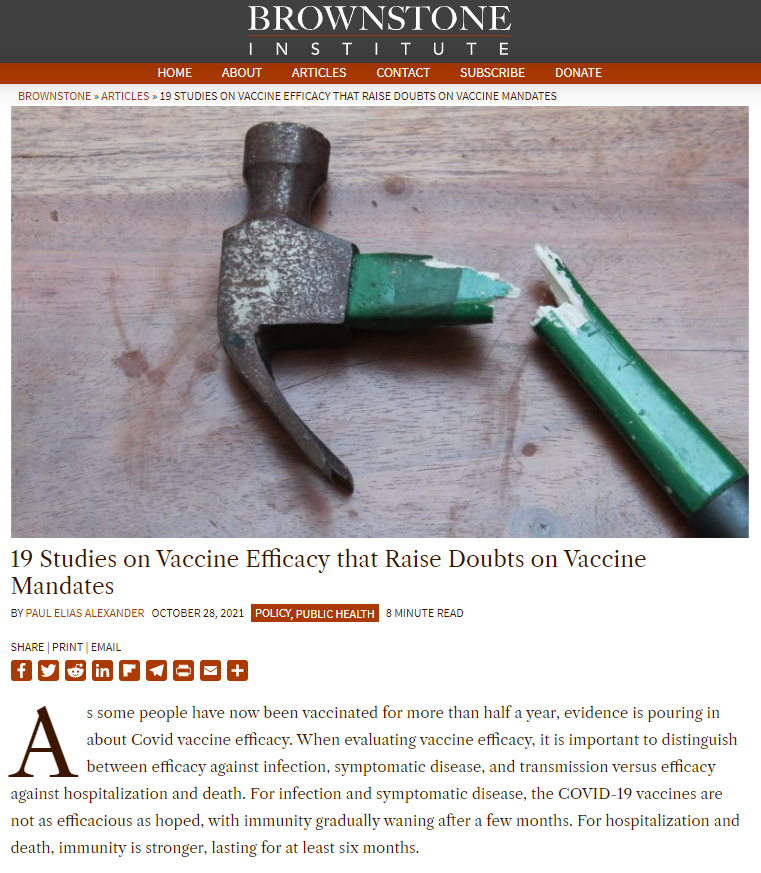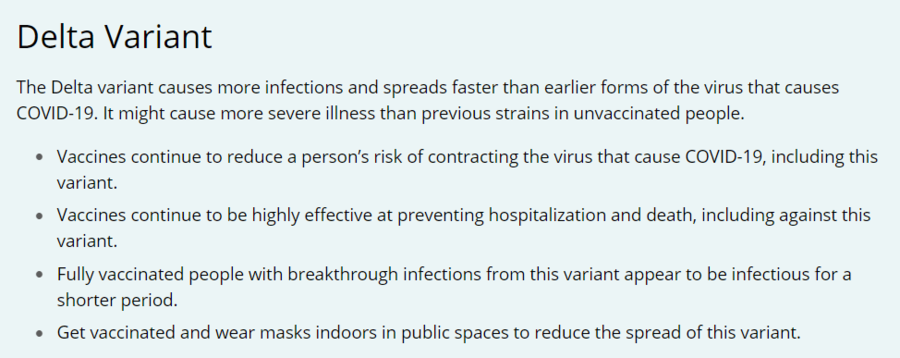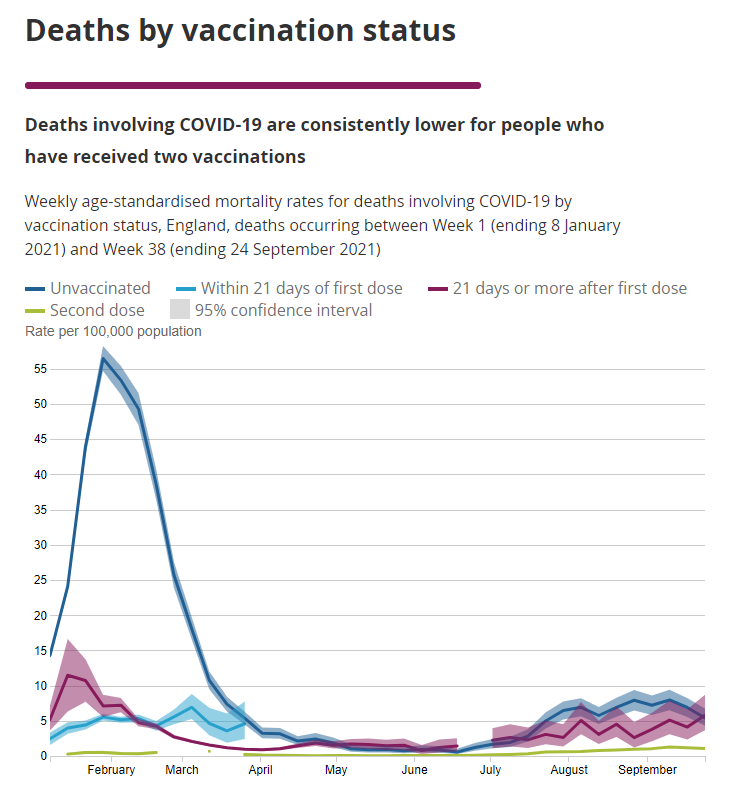
Do these 19 studies on COVID-19 vaccines show that vaccination isn't effectively fighting infection? No, that's not true. The Centers for Disease Control and Prevention evaluated over 90 peer-reviewed studies and preprint publications to determine that vaccination boosts the immune system and reduces the risk of repeat infection for those who have had coronavirus before and those who have not. The "studies" cited in the claim are mostly draft papers that have not been peer-reviewed by experts on the scientific and medical subject matter.
The claim appeared in an article published on the Brownstone Institute website (archived here) on October 28, 2021, titled "19 Studies on Vaccine Efficacy that Raise Doubts on Vaccine Mandates." It opened:
As some people have now been vaccinated for more than half a year, evidence is pouring in about Covid vaccine efficacy. When evaluating vaccine efficacy, it is important to distinguish between efficacy against infection, symptomatic disease, and transmission versus efficacy against hospitalization and death. For infection and symptomatic disease, the COVID-19 vaccines are not as efficacious as hoped, with immunity gradually waning after a few months. For hospitalization and death, immunity is stronger, lasting for at least six months.
The gestalt of the findings implies that the infection explosion globally that we have been experiencing - post double vaccination in e.g. Israel, UK, US etc. - may be due to the vaccinated spreading Covid as much or more than the unvaccinated.
This is what the article looked like on the Brownstone Institute website on November 3, 2021:
(Source: Brownstone Institute website screenshot taken on Wed Nov 03 16:41:23 UTC 2021)
In its conclusion, the Brownstone article acknowledges that vaccination programs serve a purpose but shouldn't be used to justify stronger public health measures:
What these studies show, are that vaccines are important to reduce severe disease and death, but unable to prevent the disease from spreading and eventually infect most of us. That is, while the vaccines provide individual benefits to the vaccinee, and especially to older high-risk people, the public benefit of universal vaccination is in grave doubt. As such, Covid vaccines should not be expected to contribute to eliminating the communal spread of the virus or the reaching of herd immunity. This unravels the rationale for vaccine mandates and passports.
Most of the 19 studies cited in the Brownstone article are preprints -- a full draft research paper that is shared publicly before it has been peer-reviewed.
Many of them come with this warning:
This article is a preprint and has not been peer-reviewed [what does this mean?]. It reports new medical research that has yet to be evaluated and so should not be used to guide clinical practice.
When rigorously undertaken, peer review is the essential ingredient of science publishing, subjecting the authors' work to scrutiny of the methods, the data, the analysis and the math and logic. While preprints are useful in quickly sharing new ideas, they are not ranked equal to peer reviewed and professionally edited papers a science journal has decided to publish.
While the CDC wouldn't comment directly on the Brownstone article, Press Officer Scott Pauley said in a November 3, 2021, email to Lead Stories that vaccines provide considerable protection for people who get them:
[The] CDC evaluated over 90 peer-reviewed studies and pre-print publications to understand the level of protection against COVID-19 in people who have immunity from prior infection and those with immunity from vaccines. For people who have been infected, multiple studies have shown that vaccination provides a boost in the immune response and also further reduces the risk of a repeat infection.
The CDC recommends everyone ages 5 and older get a COVID-19 vaccine to help protect against the virus and its variants. The Pfizer vaccine is authorized for everyone 5 and up. The Moderna and Johnson & Johnson vaccines are approved for people 18 years and older.
The CDC website also says COVID-19 vaccination is an important prevention measure:
Widespread vaccination for COVID-19 is a critical tool to best protect everyone, especially those at highest risk, from severe illness and death. People who are fully vaccinated can safely resume many activities that they did prior to the pandemic.
The CDC acknowledges available vaccines may not provide the same level of protection for all COVID variants, especially the delta variant:
(Source: CDC website screenshot taken on Wed Nov 03 21:33:29 UTC 2021)
CDC Director Rochelle Walensky said in an August 2021 CNN interview that the COVID vaccines are working "exceptionally well" against severe illness and death, but "what they can't do anymore is prevent transmission."
Public health officials have long said that vaccination is not the end-all when it comes to the pandemic.
The World Health Organization (WHO) website says it takes more than a shot:
After being vaccinated, individuals should continue taking simple precautions, such as physical distancing, wearing a mask, keeping rooms well ventilated, avoiding crowds, cleaning hands, and coughing into a bent elbow or tissue. Get tested if you are sick, even if you've been vaccinated ... Do it all!
Vaccinations also appear to protect the unvaccinated. When the United Kingdom ramped up its vaccination program at the beginning of 2021, the COVID death rate, especially among the unvaccinated, began a sudden decrease, according to the UK's Office of National Statistics (ONS).
The dark blue line in this graphic shows how quickly the death rate fell even for those who had not been vaccinated:
(Source: UK Office of National Statistics screenshot taken on Mon Nov 01 20:55:06 UTC 2021)
The Brownstone Institute website describes itself as a nonprofit organization that was founded in May 2021.
Its mission statement includes:
Brownstone Institute looks to influence a post-lockdown world by generating new ideas in public health, scientific discourse, economics, and social theory. It hopes to enlighten and mobilize public life to defend and promote the liberty that is critical for an enlightened society from which everyone benefits. The purpose is to point the way toward a better understanding of essential freedoms - including intellectual freedom and free speech - and the proper means to preserve essential rights even in times of crisis.















